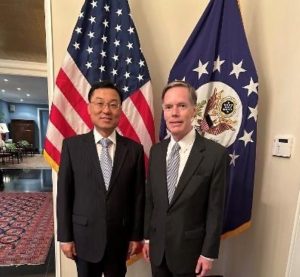China has a new ambassador to the United States: Xie Feng, previously the vice foreign minister. Xie arrived in Washington on May 23, officially replacing Qin Gang, who left the post in December 2022 to become foreign minister.
Xie has deep experience working on the China-U.S. relationship. That marks a notable contrast with Qin, who had virtually no experience in the United States before he arrived as China’s ambassador in August 2021. Instead, Qin was promoted more for his closeness to Xi Jinping.
At the time of Qin’s appointment, there was some speculation that Beijing was downgrading the importance of diplomatic experience – and the relationship-building that comes with it – in favor of political pedigree. The Chinese ambassador to the U.S. before Qin, Cui Tiankai, had a deep pedigree of work on the China-U.S. relationship before taking up his post in Washington. Xie’s appointment, however, suggests that Qin’s appointment was an aberration, rather than a new trend.
In fact, Qin’s stint as the Chinese ambassador may have always been envisioned as a short-term stepping stone to his current post as foreign minister. As Chihwei Yu and K. Tristan Tang noted in a November 2022 article for The Diplomat, if it weren’t for Qin’s appointment as U.S. ambassador, he wouldn’t have served abroad since 2011. Such experience is generally considered a prerequisite for taking up the foreign minister post – as is some experience in handling U.S. relations, which Qin also lacked. Given that, it seems likely that Qin’s elevation to U.S. ambassador was as much about padding his resume in preparation for the future promotion as serving China-U.S. relations.
Unlike Qin, Xie has deep expertise on the United States. From 1993-2014 he bounced back and forth between stints at the Chinese Embassy in the United States (serving first as counselor and spokesperson, then as a minister) and postings in the Chinese Foreign Ministry’s Department of North American and Oceanian Affairs, including as that department’s director-general from 2010 to 2014.
Xie then served as ambassador to Indonesia (2014-2017), and the Foreign Ministry’s commissioner to Hong Kong (2017-2021, meaning he was in Hong Kong through the 2019 protests and subsequent enactment of the National Security Law) before returning to take up the post of vice foreign minister in 2021. There, according to the South China Morning Post, he was specifically tasked with handling China-U.S. relations
Xie made a splash in his new post as vice foreign minister at a meeting with U.S. Deputy Secretary of State Wendy Sherman in Tianjin in August 2021. As Shi Jiangtao and Catherine Wong put it in their write up for SCMP, “In an unusually blunt message directed at the second-ranking American diplomat, he [Xie] denounced the administration of President Joe Biden for singling Beijing out as an ‘imaginary enemy’, and demanded that China be treated as an equal.”
The interaction, they noted, belied Xie’s overall reputation as “rational, media-savvy, and meticulous.” But, as I’ve argued before, in the end the individual proclivities of Chinese officials, including diplomats, matter far less than the signals they are receiving from up top. And Xie proved adept at following Xi’s lead.
Since the fireworks of that early meeting, Xie has taken a lower profile, while holding frequent interactions with Americans. U.S. Ambassador to China Nicholas Burns noted on Twitter that he had held 23 meetings with Xie in 14 months. (He chose not to point out that one of those interactions was an infamous dressing down after the United States downed an alleged surveillance balloon from China in February 2023.)
In addition to frequent meetings with Burns, Xie has met with visiting U.S. business leaders on at least four occasions, in addition to meetings with the president of the National Committee on U.S.-China Relations and the honorary president of the Julliard School. In other words, as China reopened to regular foreign travel in early 2023, Xie has largely been the official face welcoming high-profile U.S. guests.
His messages at those meetings were consistent: echoing the official policy line that China remains committed to “opening up” and will “firmly pursue a path of peaceful development.”
In remarks to reporters upon arriving in the United States, Xie noted two priorities, in descending order: “As a representative of the Chinese people, I have come here to safeguard the interests of China, and I take this as my sacred responsibility. As an envoy of the Chinese people, I have come here to enhance China-U.S. exchanges and cooperation, and I take this as my important mission.”
In other words, we can expect more “wolf warrior diplomacy” whenever Beijing sees its core interests at stake (which is likely to happen frequently, if the recent past is any guide). But Xie chose to focus more on the second priority, enhancing exchanges and cooperation, and thus largely struck a hopeful tone in his remarks.
“Obviously there are profound differences between the two countries, and the relationship is faced with serious difficulties and challenges,” he said. But he also noted the historical context that “this relationship has gone through many twists and turns in the past half century, yet it has always been able to move ahead.”
Saying that the “China-U.S. relationship has once again come to a historical crossroads,” Xie said both countries “should take concrete actions to deliver on the common understandings between President Xi Jinping and President Joe Biden, and explore the right way to get along with each other in the new era.”
There’s a window of opportunity open, with recent talks between U.S. National Security Advisor Jake Sullivan and China’s top diplomat Wang Yi striking the most hopeful note in years. While no one expects China and the United States to become close friends, they can take steps to manage the obvious tensions between them by building trust and confidence. Xie’s appointment, given his 30 years of experience on China-U.S. relations, is a strong signal that Beijing is open to truly doing that work.

































